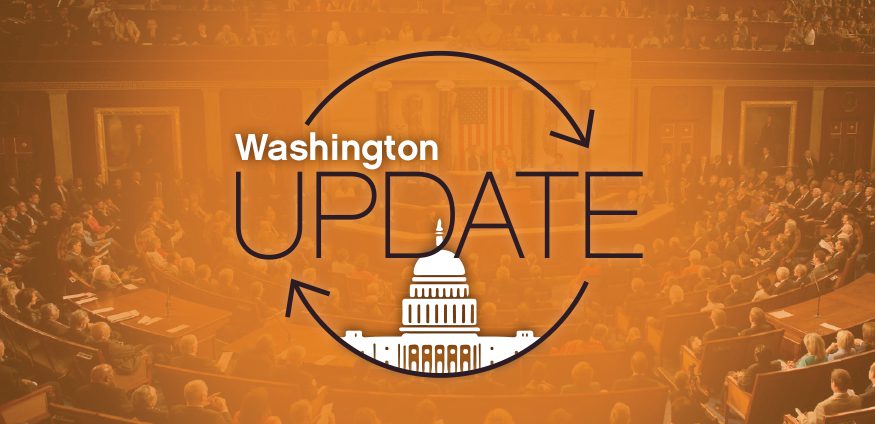Budget & Appropriations
Fiscal Year 2018 Appropriations
- Last week, the House passed an omnibus appropriations bill before leaving for a week of recess. In passing the eight-bill package, the House incorporated the previously passed four-appropriations bill “minibus” into that package.
- This means they now have a 12-appropriations bill omnibus to send to the Senate. Overall, the bill surpasses the spending cap for defense spending by $72 billion but stays under the non-defense spending cap. This package does not have the votes to pass the Senate as written.
- The Senate is still working on marking up and passing appropriations bills out of committee. They are working from different topline spending numbers than the House, making the need for a bipartisan budget deal on fiscal year 2018 spending even greater. If they cannot come to a deal on raising the spending caps, they cannot pass full-year appropriations bills for 2018 without either including further cuts or triggering across the board cuts in early 2018.
Budget Resolution
- The House did not bring its budget resolution to the House floor for a vote before leaving for recess. We could see movement on a resolution in the House next week or in early October if the House Republican Caucus can come to agreement on an outline for tax reform.
- As a reminder, passing a budget resolution would set up a fast-track process that would allow Congress to work on tax reform and also make changes or cuts to mandatory spending programs like SNAP, Medicaid, and refundable tax credits.
Medicaid
- Last week, Sens. Bill Cassidy (R-La.) and Lindsey Graham (R-S.C.) introduced a repeal bill that would eliminate the Medicaid expansion and market place subsidies for low-income families, and cut Medicaid by $239 billion by instituting block grants to states.
- The plan would also cap and cut Medicaid for seniors, people with disabilities, and families with children, cutting funding outside expansion by about $175 billion between 2020 and 2026.
- Similar to the House bill’s “MacArthur amendment,” the Cassidy-Graham bill would let states waive the Affordable Care Act’s prohibition on charging people with pre-existing conditions higher premiums, as well as its essential health benefit requirements.
- The Congressional Budget Office is currently in the process of scoring the bill. We expect the score will indicate a loss of coverage to 15 million people.
- Cassidy and Graham are in a race against a Sept. 30 deadline to get the 50 votes among Republicans needed to win a Senate majority under budget reconciliation procedures that the parliamentarian has ruled would expire that day.
- Senate Majority Leader Mitch McConnell (R-Ky.) has indicated that if there are 50 votes for the bill, he will bring it to the floor for a vote. The bill would not go through regular order, would not have debate time, and would be voted on along party lines.
- There are not enough votes in the Senate to pass this bill through reconciliation. Sens. Susan Collins (R-Maine), Lisa Murkowski (R-Alaska), and Rand Paul (R-Ky.) have indicated that they are a “no” or a “likely no” vote. Sen. John McCain (R-Ariz.) has expressed interest in the bill, but continues to urge regular order and bipartisanship for any healthcare reform. Meanwhile, Sens. Lamar Alexander (R-Tenn.) and Patty Murray (D-Wash.) are continuing to push for bipartisan reforms and are urging the Senate to focus on their effort instead of the bill put forth by Graham and Cassidy.
- There are nine legislative days left on the calendar before the reconciliation instructions expire. It will be challenging for McConnell to get the Cassidy-Graham bill across the finish line in that time frame.
Immigration
- Democratic leadership and President Trump supposedly struck a deal on Deferred Action for Childhood Arrivals (DACA) last week. However, Congress doesn’t seem to be buying it.
- Democrats are continuing to push for the passage of the Dream Act (S.1615/ H.R. 3440) and are beginning to gain Republican support in the House with Reps. Jeff Denham (R-Calif.-10) and David Valadao (R-Calif.-21) signing on as co-sponsors. This brings the co-sponsor count of H.R. 3440 to 195 Democrats, which is the entire caucus, and four Republicans.
- The Recognizing America’s Children (RAC) Act (H.R. 1468) is no longer a Republican-only bill. Rep. Kyrsten Sinema (D-Ariz.-9) signed on as a co-sponsor with the promise that the bill’s original co-sponsor, Rep. Carlos Curbelo (R-Fla.-26), would co-sponsor the Dream Act. In addition, Sen. Thom Tillis (R-N.C.) plans to introduce a Senate companion to the RAC Act as early as Tuesday, Sept. 19.
- Bread for the World continues to push for passage of the Dream Act. The Dream Act is the most comprehensive reform for “Dreamers” and provides a pathway to citizenship for nearly 500,000 more “Dreamers” than the RAC Act.
Farm Bill
- The Senate Agriculture Committee held a hearing on the Supplemental Nutrition Assistance Program (SNAP) on Thursday, Sept. 14. The hearing included panelists from USDA, as well as from across the country, to discuss the issue of quality control and error rates in SNAP, as well as the effectiveness of SNAP benefits. A recording of the hearing, including written testimony from all witnesses, is available at agriculture.senate.gov/hearings/nutrition-programs-perspectives-for-the-2018-farm-bill.
- A major takeaway for Bread activists from the hearing was that the issue of error rates is primarily a state administration problem and not a SNAP participant fraud problem. USDA has not been able to release error rates for the last several years due to discrepancies and poor data reporting from more than 40 states. The USDA believes that has kept error rates artificially low. The second panel of witnesses also testified to how effective and important SNAP is to millions of Americans.
Act Now!
Republicans in the Senate are currently trying to push through partisan healthcare legislation by Sens. Bill Cassidy and Lindsey Graham. The Cassidy-Graham bill would eliminate the expansion of Medicaid, which has extended coverage to 11 million low-income adults, and instead block grant the Medicaid program. If this proposal passes, millions will lose health care coverage and Medicaid as we know it would end.
Call (800-826-3688) your senators today. Tell them to oppose the Cassidy-Graham bill that would cut Medicaid for millions and support instead a bipartisan, transparent effort that ensures American families do not have to choose between paying for food or paying for medical care.



